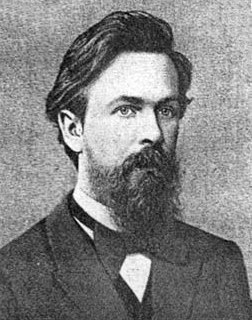

Andrei Andreevich Markov
1856-1922
Andrei Markov lived most of his life in St. Petersburg, Russia. During his lifetime, St. Petersburg (once Leningrad) was the capital of czarist Russia, a major seaport and commercial center, as well as an international center of literature, theater, music, and ballet. Markov's family belonged to the upper class; his father worked for the forestry department and managed a private estate.
In high school, Markov showed a talent for mathematics but generally was not a good student. He studied mathematics at St. Petersburg University, where he received his bachelor's, master's, and doctor's degrees. He then went on to teach at St. Petersburg University. The head of the mathematics department, P. L. Chebyshev, was a famous mathematician and statistician. Markov became a consistent follower of Chebyshev's ideas. Nominated by Chebyshev, Markov was elected to the prestigious St. Petersburg Academy of Sciences.
Markov's research was primarily in the areas of statistics, probability theory, calculus, and number theory. His most famous work, on Markov chains, was motivated solely by theoretical concerns. In fact, he never wrote about their applications other than in a linguistic analysis of Pushkin's Eugene Onegin.
During the early 20th century, Markov participated in the liberal movement that climaxed in the Russian Revolution. When the czar overruled the election of author and revolutionary Maxim Gorky to the St. Petersburg Academy of Sciences, Markov wrote letters of protest to academic and state officials. When the czar dissolved the Duma (an elected assembly), Markov denounced the czarist government. When the government celebrated the 300th anniversary of the House of Romanov (the czars' house), Markov organized a celebration of the 200th anniversary of the publishing of Jacob Bernoulli's book on probabilities, Ars Conjectandi.
After the czar had finally abdicated, Markov asked the academy to send him to teach mathematics at a secondary school in a small country town in the center of Russia. He returned to St. Petersburg after a winter of famine. Soon after his return, his health declined rapidly, and he died.
The biography was written in Johnson/Mowry book: Finite Mathematics